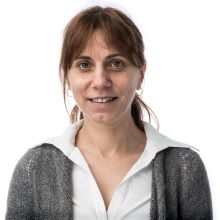Leadership team
Krasimira Tsaneva-Atanasova - Principal Investigator

Krasimira Tsaneva-Atanasova is Professor of Mathematics for Healthcare in the Living Systems Institute and the Department of Mathematics at the University of Exeter (UoE), UK.
She received her MSc (Mathematics) from the University of Plovdiv, Bulgaria and PhD (Applied Mathematica) from the University of Auckland, New Zealand. She joined the Department of Engineering Mathematics at the University of Bristol in October 2007 as a lecturer and was promoted to a Reader in Applied Mathematics in 2012.
Krasimira moved to the College of Engineering, Mathematics and Physical Sciences, University of Exeter in July 2013. Her research and professional activities aim to inform novel applications of mathematics to enable the development of quantitative methods for healthcare and healthcare technologies. In her research, she develops and analyses mathematical models for applications to personalised prediction and clinical decision support in prevention, diagnosis or treatment of health-related conditions. She also serves as Associate Dean for International and Development in the College of Engineering, Mathematics and Physical Sciences at UoE (2018-2021).
Robert Beardmore

In his research Professor Robert Beardmore is interested in mathematical modelling of evolutionary datasets, particularly relating to antibiotic resistance. He also undertakes mathematical analysis of differential-algebraic equations, and focuses on applications of mathematical analysis/computation to evolutionary biology and physics.
Prof. Beardmore's research projects include applying fluids DFT to understand the action and dose-dependence of antimicrobial peptides (with Laurie Frink), understanding complete viral (phage) resistance in E.coli (with Justin Meyer), and using optimisation theory as a basis to model optimal antibiotic use (with Hinrich Schulenberg).
Peter Challenor

Professor Peter Challenor has broad interests; mainly about uncertainty in the natural world. These range from the statistical analysis of complex numerical models (such as those used to simulate climate) to the interpolation of noisy data and the estimation of the amount of renewable energy in the ocean.
Peter is the principal investigator on the NERC RAPID-WATCH project RAPIT looking at the risk of the shut down or significant slowing of the Atlantic Meridional Current. This project relies on thousands of climate simulations carried out by members of the public via climate prediction.net.
